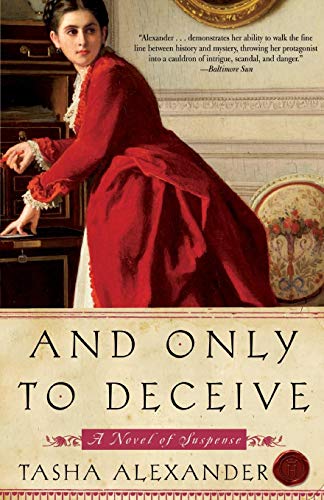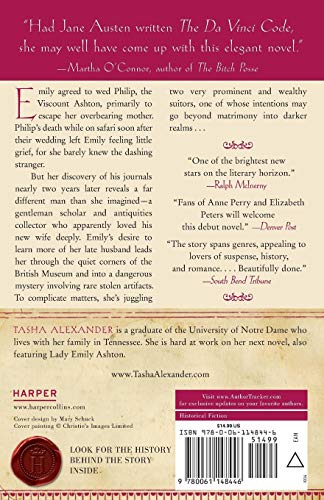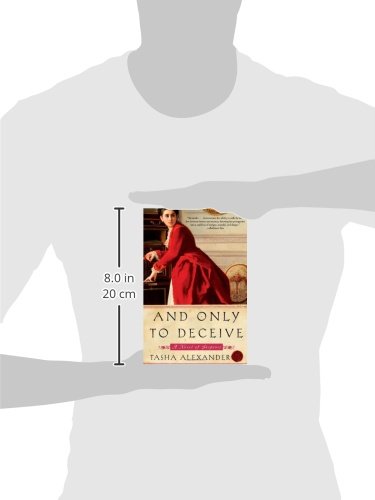معلومات عنا
دعم العملاء
احصل على التطبيق

قم بتوجيه الكاميرا لتنزيل التطبيق
حقوق الطبع والنشر © 2024 Desertcart Holdings Limited




And Only to Deceive (Lady Emily Mysteries, 1)
L**S
Adventurous Victorian Widows: Who Wins?
Having just read both And Only to Deceive, by Tasha Alexander, and Silent in the Grave, by Deanna Raybourn, I wanted to compare the two, as they both begin with two newly-minted widows impatient with living in mourning and eventually deciding to investigate their late husbands' legacies. Lady Emily is the protagonist from And Only to Deceive, and Lady Julia is the protagonist from Silent in the Grave, but AOD contains many ancient Greek allusions, and its protagonist is also known as Kallista, so I'll call her that for the sake of clarity here.Raybourn and Alexander's novels possess many similarities. Both authors do a fine job of evoking the social conventions and atmosphere of Victorian England. Neither one describes the setting so well that one suspects either is a literature or history professor, but both authors are gifted enough with description that the reader is able to feel comfortable in the time and place. Both main characters weren't particularly attached to their husbands, although interestingly enough one woman comes to dramatically despise certain aspects of her husband's character by the end of the novel, while the other woman comes to actually fall in love with her dead husband by the end of her story. One husband turns out to be a significantly more honorable human being than the other. Both widows, however, turn out to be rather similar. Both women aren't particularly thrilled about mourning husbands that they didn't particularly love, and both widows are wealthy and seek slightly more independence through choices of either friends, new clothes and hairstyles, etc.As far as differences in plot and character change go, after the death of her husband, Kallista goes to the British Museum and discovers a newfound interest for ancient Greek art and literature. She cultivates this passion and accordingly makes scholarly friends, but her love interest, Colin Hargreaves, is always in the background running mysterious errands. Colin is an upper-class neighbor of hers who was her husband's best friend. Meanwhile, Lady Julia is contacted by the dashing but unpredictable Nicholas Brisbane and informed that her husband's death was murder. Lady Julia subsequently visits Brisbane several times in his rooms and endures several different interrogations. Both husbands, in the end, are (surprise!) found to have been murdered.I found Kallista to be a more interesting character than Lady Julia, probably because I love most things to do with the ancient Greek world, and I liked how the Greek art and literature plot unfolded in Kallista's story. I thought that Brisbane was definitely a more interesting character than Hargreaves, however: it would seem that Alexander's female protagonist was more interesting than the love interest in her story, and Raybourn's male love interest was more interesting than her protagonist, at least in this first novel in the series.What would Keats and Aristotle say? Both these novels were fun. I think the pace was a little better in AOD, but that novel also had a gaggle of anachronistic-sounding girlfriends that surrounded the protagonist as well, so there are points both for and against that novel's superiority. I liked how both authors genuinely attempted to show how both widows felt badly that they didn't mourn their husbands more, and that both women were able to become more themselves once their husbands were gone. Neither novel really seemed to contain magnificent greatness of either content or execution, but both were enjoyable and worth reading. If you're looking for a female protagonist in a series with more authentic period detail and somewhat better writing, as well as more humor but less depth, I'd suggest the Amelia Peabody series. That series, however, is set in Victorian British Egypt, not England.
L**A
Art theft, Greek mythology and Victorian women combine to make a good book
There's a reviewer quote on the back of this book that says something to the effect of if Jane Austen had written the Da Vinci code it would have come out like this novel. I only noticed this quote when I was halfway through the book but seeing it made me smile because one of the first things I noticed about this book is that the characters sound exactly like the people in a movie version of one Jane Austen's books-but not like the people in the books themselves. They're too cynical and not polite enough for that. Anyway, this author's voice is enjoyable to read because of the familiar similarity to some of my favorite movies and the added sarcasm makes parts of it a hoot.This book contains three of my favorite things to read about, though I didn't know it at the time I first bought this novel which made this book a delightful surprise. These things are: Greek mythology, intrigue/crime and love in Victorian England. This is the story of Emily Ashton, whose recent husband Phillip Ashton has just died on a safari in Africa. This doesn't bother her much because she only really married him to get away from her mother and didn't know him well enough to morn him in any way. His death leaves her wealthy, but with two years of mourning to get through; she has a great deal of time on her hands.So she spends this time learning all about one of Phillip's main interests, the story of the battle of Troy in the Iliad, by Homer and Greek antiques. Most of Phillips finds were donated to the British museum and as Emily studied and learns more about her late husband and his world she learns through his journals how much he loved her and she begins to fall in love with her dead husband (tragic really.) At the same time two men appear on the horizon, both friends of Phillips, Colin and Andrew competing for her affection.But Emily is discovering that some of the pieces in the British museum, pieces donated by her now beloved dead husband, are forgeries, and Phillip may have been a thief. Even worse, Colin or Andrew may be involved in these thefts. And then come the news that Phillip may still be alive....This was a good book. As I said previously I really enjoyed the authors writing style and the dialog was all very cute (if you've seen "Emma" you'll just hear the words in your head.) Emily is a great heroine, she's smart, has actual self esteem for a women of her time and real ideas about how women should function in society, and the whole falling in love with a dead person thing is just a wonderful literary device because it makes for an unspeakable tragic situation-always mourning the time you lost with a person you now love. Aside from that the book is romantic, suspenseful and just all around good.But it doesn't have that special spark that makes a book great, so, four stars.
D**Y
Ho hum.......
I hate to start a book and not complete reading it, this fell into the category of trudging on to the end with grim determination rather than a gripping unputdownable story. I will read almost any genre apart from westerns so don't consider myself a book snob but this jarred on occasions, not the authors fault as it is probably written for a mainly American audience. I would be ploughing through the endless descriptions of Greek relics and bottomless cups of tea, (note to author) British do more with their afternoons than drink cups of tea and always have done. When an Americanism would seep into the characters conversation which would spoil the reading thread for me. I loved Emily's mother she seemed to be one of the few characters with any passion about her, was bored to death by the Greek writers and sculptures and found Emily herself rather tepid. I also didn't like the premis that experienced and knowledgeable managers in the British Museam couldn't recognise a forgery when they were looking at it, especially when the forger has kindly marked it with his initials. And who has a hero with a name like 'Colin'? I have completed the novel whether I will read another in the series I don't know, it depends on what else is waiting on my bookpile, my next read is S.J.Bolton's 'The Craftsman'.
M**A
And Only to Deceive
Sometimes, a book just doesn't work for me no matter how much I want to enjoy it. And Only to Deceive have everything that I should like, interesting characters, a mystery and a tragic love story. However, somewhere along the way the story just lost my interest and unfortunately I never found it as interesting as it was, in the beginning, to read.So, what went wrong? Why did this book not appeal to me? I think the biggest problem for me was that the plot, Emily's hunt for the truth about Philips involvement in the forgery of art, or rather the whole forgery plot was so simple to figure out that it took away the enjoyment to read the book. Since this book is bit old now and several new books have been published was it easy to cross one person of the list as suspects and that made the list of people that could be involved pretty small. And, a book that started off interesting just lost its spark along the way.I did find Emily's newfound love for Philip tragic and sweet, but alas even that went a bit boring after a while. She discovered new things about him and she realized that the man she married was a different man than she had imagined and suddenly she fell in love with him. With the problem that he is dead. Like the forgery part that also lost its spark after a while.However, I do want to continue with the series. I did like Emily enough to want to read more about her. I just hope the stories in the rest of the books are better and that the mysteries will be much more interesting to read about. Also, I'm not really that fond of Colin, and I hope that I will grow to like him.
A**
victorian mystery
This book is part of a trend for English historical mysteries written by American authors. This one suffers from the same small niggles as the others - people visit with rather than just visit, say fall for autumn etc but otherwise is a very superior example of the genre. The author has included a set of very interesting notes at the end showing her research and why she chose the heroine she did.Lady Emily Ashton is a widow after a very short marriage and becomes involved in unravelling both a mystery of ancient greek artifacts and forgeries, as well as trying to get to know her dead husband. The author has woven a good yarn that keeps the pages turning - the story twists and turns very satisfactorily throughout. Emily is a good heroine, she is stubborn and inclined to be arrogant but uses her intelligence well. The misunderstandings arise due to lack of information.I thoroughly enjoyed it, it was well written and the female characters richly drawn. I would agree with another reviewer that the males were a little more lightly sketched, but in the Victorian world we are visiting the main contacts of a respectable widow would be her female friends and relatives. I would definitely recommend this.
D**T
And Only to Deceive
Lady Emily Ashton was widowed after only a few months of marriage and she now finds herself rich but constrained by Victorian society to stay in seclusion as she mourns her late husband Phillip. But she didn't really know her husband at all well and had accepted his proposal more to get away from her dominating mother than because she was in love.Now she is bored and takes up the study of Greece and Rome and starts to learn Greek. Her husband was interested in antiquities and she wonders why everyone is so interested in his papers. Was he involved in something illegal and whom can she trust now?I found the first half of this book slow going but I persevered because I liked Emily and felt sorry for her situation. The nook became much more interesting and exciting in the second half and Emily grows and matures as the story progresses. The writing is good and I did like the characters and the background is well researched. I have bought the next one in the series and I'm sure I will enjoy it.
K**R
Wily Widow
A deeply satisfying read. Sometimes I have a problem with books written in the first person, but forgot my misgivings almost immediately as the heroine grew in confidence and decision with every chapter, admitted to her faults, learned from her mistakes and gradually came into her own.The discussions on classical artefacts and literature were fascinating and the characters came strongly to life from their words and actions rather than their status and appearance. The dilemma of falling in love with a dead man and coming to terms with his potential fallibility was beautifully drawn and I thoroughly enjoyed the variety of characters who revealed themselves throughout the book.I like a book where I have learned something and am inspired to read more on the subjects which are raised, and I love a book where the protagonists don't behave in predictable patterns.Just finished it and have immediately ordered the next 2 in the series.
ترست بايلوت
منذ 3 أسابيع
منذ شهر